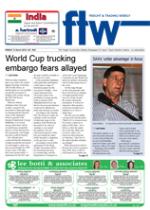The port authorities are
trying to get rid of eight
ship repair facilities – and
the words that immediately
did the rounds, especially
in the port city of Durban,
were “privatisation of port
facilities”.
But, effectively, nobody’s
buying anything.
“It’s not privatisation,”
said Rob Deane, MD of
Elgin, Brown and Hamer.
“It’s not an acquisition
exercise. They’re looking
for someone to pay
them money to lease the
properties and to operate
the facilities.”
And, in a lot of other
“off the record” chat with
FTW, the private sector
shipbuilding and repair
industries seem to be
looking on it as a bit of a
duff deal.
Another senior ship repair
executive described the
facilities to FTW as “a lossmaking
bloody shambles
which Transnet doesn’t
have a clue how to run; and
an absolute mess, where
nothing works”.
The problem, he added,
was that the TNPA didn’t
have the capital to sort
things out, and came
up with the bright idea
of “concessioning” the
facilities.
Not that it’s new. The
concessioning concept
was devised when Maria
Ramos was still in charge
of Transnet, but the
practical application of the
scheme has stuttered along
for the past four to five
years before it was finally
triggered with various
newspapers carrying the
notice of the offer recently.
In terms of this notice,
harbour landlords Transnet
National Ports Authority
(TNPA) invited interested
parties to submit requests
for proposals (RFPs) to
become the operator or
operators of existing ship
repair facilities in a number
of South Africa’s ports.
And there are eight
facilities up for offer. The
Durban Prince Edward
graving dock; the Durban
floating dock (which FTW
has been told is currently
out of order, is in a badlycorroded
condition, and has
also had a major fire in its
electrical installation); the
Cape Town Sturrock dry
dock, Robinson dry dock
and Cape Town synchrolift;
the East London Princess
Elizabeth dry dock; the Port
Elizabeth slipway; and the
Mossel Bay slipway.
According to Transnet’s
Nico Walters, who is
handling the technical
matters surrounding the
deal, the TNPA is holding
a compulsory briefing
session in Durban on March
15. This, he added, will
only be attended by those
parties that have purchased
RFP documents. He also
confirmed that compulsory
site visits were scheduled
for March 16-31 – and that
the closing date for RFP
submissions was June 29.
Walters also pointed
out that the TNPA notice
advised that preference
would be given to broadbased
black economic
empowerment (BBBEE)
compliant companies.
Not that this purely
restricts the offer to
companies on the local
scene. “The advert has
gone out both locally and
internationally,” he told
FTW. “But we’ll only know
if there is any international
interest once all the RFPs
are in.”
But what is the interest on
the SA scene?
“Yes, we’ll definitely
participate,” said a senior
industry spokesman,
indicating that all the major
local ship repairers would
have an interest in this
development.
“But,” he added, “We’ve
very little faith that a
common user facility will
succeed.”
Louis Gontier, MD of SA
Shipyards, had a similar
suspicion.
“Basically, we feel that
this TNPA scheme as
its envisaged should not
go ahead,” he told FTW.
“because if the docks
fall into the hands of one
individual it would just
create a monopoly – with all
its dangers.”
That fear is shared by all.
“The model we’d like to
see,” said our anonymous
executive, “is a holding
company – with everyone
who wants to be involved
putting in a share of the
funding.”
Ship repair facilities offer ‘underwhelming’ opportunities
12 Mar 2010 - by Alan Peat
0 Comments
FTW - 12 Mar 10

12 Mar 2010
12 Mar 2010
12 Mar 2010
12 Mar 2010
12 Mar 2010
12 Mar 2010
12 Mar 2010
12 Mar 2010
12 Mar 2010
12 Mar 2010
Border Beat
25 Jun 2025
17 Jun 2025
Poll
Featured Jobs
New
New
